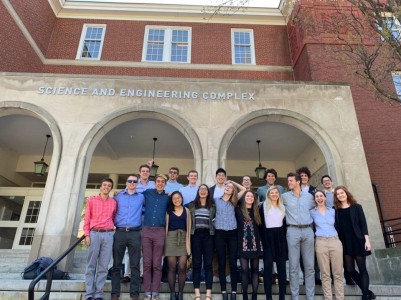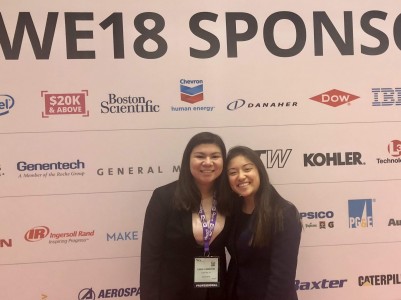Why Tufts Engineering?: Kristina Chu '19
Welcome back to our interviews with Tufts Engineering alumni for our series, “Why Tufts Engineering?” This week, we are interviewing Kristina Chu, a former Environmental Engineering major and 2019 graduate. She shares with us important lessons she learned during her first semester, her favorite courses (engineering & liberal arts!), and professional opportunities at Tufts.
Hi Kristina! Can you share with us your college search process? Did you have an interest in engineering when you were in high school?
When applying for college, I did not really know what I wanted to major in. For me, all I knew was that I really wanted to go to Tufts after my first campus visit and tour. When I was filling out my application for the ED1 cycle and came to the question about major selection, Environmental Engineering caught my eye. I had not heard of the field before and was curious to know more; so, I ended up on the Tufts Civil and Environmental Engineering webpage. Clicking around, I was captivated by the department’s work tied to human health and renewable energy. Even though I was not 100% certain this was what I wanted to study, I figured environmental engineering would not be a bad place to start!
How was your first semester in the School of Engineering?
My first semester in SOE, I started out enrolled in “Designing Stuff People Can Use” (my EN1 selection), Calc 1, Chem 1, Ceramics at the SMFA, and Intro to International Relations (IR) - 4.5 credits! I had spoken with my pre-major advisor about my interest in international development work and (being an overly ambitious first year) a double major of Environmental Engineering and IR. She warned that this probably would not be doable in 4 years, but she did suggest I take Intro to IR because it would be one of the core major requirements and give me exposure to the department. Two and a half months into the semester, I was struggling with Intro to IR, confused with how I could be devoting so much time and energy yet not scoring very well on the exams/assignments. I didn’t want to drop the course because I knew I would be disappointed with myself for quitting and was worried about only taking 3.5 credits. Eventually, on the last day to drop a course, I dropped out. Boy, was it a huge weight off my shoulders! This being said, it took a long while for me to stop evaluating my self-worth relative to my peers -regarding both the numerical grading merit system and course load management.

Thanks, Kristina for sharing that with us. I agree with you—first semester can be tough. You can plan out every detail of freshman year, but if things don’t go according to plan, it’s important to realize that you have time to bounce back.
You took classes at the SMFA and in the Political Science department; I’m curious, what other classes stood out to you during your time at Tufts?
I took so many cool classes at Tufts, some that were required for my major and others that were not. One of my favorite environmental engineering classes was Public Health Engineering with Daniele Lantagne. We learned about the efficacy in connecting policy-making with engineering to tackle public health issues like natural disasters/outbreaks, population displacement, gun violence, and malnutrition.
Another major concentration course that I loved was Intro to GIS. I came out of the class with both a useful skill and huge appreciation for/fascination with the power of data visualization. *See here for my final GIS poster!
Even though it was not required, I made sure to take at least one liberal arts course each semester. I guess I am a learning nerd, because I would scroll through all the course options on SIS when they were released each semester and end up with tons of potential courses in my cart. I think being able to take liberal arts courses like Waste Management (with the Ex-College department) and Writing Asian American Diaspora was a huge part of why I loved my undergrad experience. It was so refreshing to use other parts of my brain and not be confined to the SEC all day every day. I also know that they were just as formative for me as my engineering curriculum.

What was the engineering community like?
As each year of my undergrad progressed, I felt more and more connected to the Civil and Environmental Engineering (CEE) department. In the latter half of undergrad, I was able to take upper-level major courses that piqued my interest and built on the fundamentals I had learned earlier on. I liked that our CEE class was small (~30-40 students), because it meant we could get to know our professors and one another better.

Can you share with us any professional opportunities you had as an undergrad? How did these internships, organizations, events, etc.…help you in navigate your career choices?
During the summer after my sophomore year, I interned at a really awesome non-profit focused on solving the water crisis called Charity: Water. I had found this fellowship through the Tisch College of Civic Life’s Tisch Summer Fellows program, which has positions available in DC, NYC, and Boston. I enjoyed the program because Tisch College set up networking events and fellow outings for each city, allowing me to get to know other Tufts students/alum in addition to the staff at Charity: Water.
Being an active member in Tufts Society of Women Engineers (SWE) had played a huge role in my professional/academic development while I was at Tufts. SWE organized networking nights, women in engineering panel discussions, major advising, and events to bring the Tufts SWE community closer. With Tufts SWE, I attended a few annual, national SWE conferences--one of which landed me my summer internship following junior year. As an Environmental Compliance Engineer intern at Intel in Hillsboro, OR, I was exposed to different applications of an environmental engineering degree. I learned about hazardous waste management, regulated stormwater infrastructure, and air pollution control measures. Plus, I had an opportunity to experience working in a large corporation, after having interned the previous summer for a smaller non-profit.


Thank you, Kristina, for sharing your engineering experience with us!
To round out our “Why Tufts Engineering?” series, I will be interviewing Will Edmonds! Will is a mechanical engineer from Vancouver, Canada and is currently working in Louisville, KY as a Client Support Analysist.